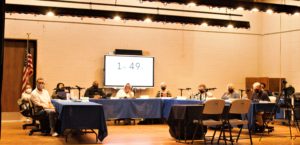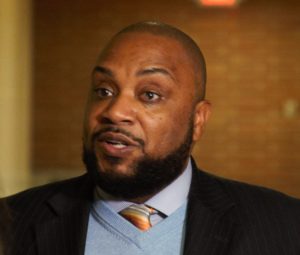By Harold C. Ford
The May 11 and 18 meetings of the Flint Board of Education (FBOE) – together lasting nearly 12 hours – began with purported good news that Flint Community Schools (FCS) had been released from the imposition of an enhanced deficit elimination plan (EDEP) by the Michigan Department of Treasury.

The Flint Board of Education listen to members of the public speak during Wednesday’s meeting. (Photo by Tom Travis)
Any euphoria elicited by the EDEP-dismissal announcement soon evolved into a parade of FCS constituents anxiously and unanimously urging the district not to close schools – specifically Pierce Elementary and the Accelerated Learning Academy.
Ongoing infrastructure woes at its aging buildings continued to plague the district with reports of crumbling masonry at Doyle-Ryder and an inability to start up newly-installed air conditioning units at Pierce and Freeman due to electrical grid shortcomings.
The May meetings revisited an all-too-familiar theme of board disunity.
EDEP disappears, not so indebtedness
“I received a call from Treasury (Michigan Department of Treasury) yesterday,” said Kevelin Jones, FCS superintendent, at the start of the May 11 meeting. “In that call, Treasury let me know that our district will no longer need to submit an enhanced deficit elimination plan.”

FCS Superintendant Kevelin Jones. (Photo by Tom Travis)
Jones’ announcement generated three rounds of smiles and applause by FBOE members. “This means … the state won’t be looking over our shoulder,” he said.
The district had been under the watchful eye of Michigan’s state government – specifically its Department of Treasury – for many years. Most recently, two mended EDEPs were sent to Treasury by FCS in calendar year 2020.
“This doesn’t mean Flint doesn’t have a deficit,” Jones cautioned.
Jones’ caution has often been expressed by others:
- “The district projects to remain in deficit until Fiscal Year 2035-36.” –Michigan Department of Treasury, September, 2020
- “You’re definitely not going to be in excellent financial shape for a long time.” –Holly Stefanski, assurance manager, Plante Moran, an auditing firm then serving FCS, January, 2022
- “This (COVID relief funding) gives us the appearance that we are not operating in a deficit. I want to stress … we are still in a deficit.” –Ayunnah Dompreh, then-FCS director of finances, February. 2022
ESSER funds provide temporary solvency
Jones said dismissal of the EDEP “is due to the work … done as it pertains to our ESSER (Elementary and Secondary School Relief/ COVID relief) funds and having a fund balance. We are in a position that our fund balance is in a space where we need to be at the time.”
“We still need board members to eliminate some debt,” Jones warned. “We still need to make sure we are fiscally responsible.”
[A more complete overview of the FCS financial profile can be found in a May 16 online posting by EVM.]
“To close or not to close?”
“To close or not to close?” asked a Pierce teacher during a time for public comment, “That is the question tonight.”
Jones had said “two of our schools (are) in consideration of closure.” He was referencing reports and rumors about the possible closures of the district’s Pierce and ALA buildings.

Handmade signs held by parents and students at the Flint Board of Education meeting on Wednesday. (Photo by Tom Travis)
One day prior to the FBOE meeting, on May 10, WNEM Channel 5 and ABC12 News reported on the possible closure of Pierce. Rumors had ALA’s nontraditional students being relocated within the Southwestern building alongside traditional students as a school within a school.
“No decisions have been made about any or which schools will be closed,” advised Chris Del Morone, FBOE assistant secretary-treasurer.
Nonetheless, 30 speakers paraded to the microphone expressing concern about the possible closures. Pierce is located on Flint’s near east side in the so-called East Village area close to the city’s college and cultural center. ALA, an alternative school serving students in grades 7-12, is also located on Flint’s east side at 1602 S. Averill Ave., across from Dort Federal Event Center, near the Evergreen Estate community.
At the conclusion of its May meetings no building closures or accompanying staff layoffs were announced.
“All of our buildings gotta be renovated.”
Danielle Green, then-FBOE treasurer, reflecting on the condition of Flint’s aging school infrastructure, said in August 2021, “All our buildings gotta be renovated.” Her statement has proved prophetic.

Durant-Tuuri Mott school on University Ave near Kettering University. (Photo by Tom Travis)
New reports of crumbling infrastructure – literal and figurative – were brought to the board’s attention at their May meetings.
Doyle-Ryder
According to Pete Medor, FCS director of operations, the masonry – mortar and bricks – of four roof chimneys on the 121-year-old Doyle-Ryder building need repair. The needed repairs –unexpected and not included in the previously-approved budget for black mold remediation and roof repair – would amount to just more than $31,000.
“I worked in that school for several years,” recollected Joyce Ellis-McNeal, FBOE president. “Everything is falling apart there.”

A student masking up as she enters Doyle-Ryder school. (Photo by Tom Travis)
Due to the presence of black mold, Doyle-Ryder has been closed to students most of the 2021-22 school year; its students are currently attending Potter.
FBOE approved the funding request by a 6-0 vote margin.
Pierce, Potter, Freeman
For some two years, Johnson Controls has been attempting to upgrade HVAC (heating, ventilation, air conditioning) systems in six of Flint’s school buildings at a price tag that exceeds $15 million. The electrical infrastructure in three of those buildings –Pierce, Potter, and Freeman – did not pass a recent electrical inspection that would permit operation of newly-installed HVAC infrastructure.

Freeman elementary school in the south end of the Flint Community School District. (Photo by Tom Travis)
According to Medor, the problem at 70-year-old Pierce was “minor” and would require no additional funding to resolve.
The electrical problems at 70-year-old Potter and 71-year-old Freeman were deemed “major” and would require significant additional funding to repair: $62,104 at Freeman; $75,295 at Potter.
“The service that comes into these buildings is not adequate,” Medor said. Johnson Controls told FCS administration that service on both buildings needed replacement; they would deliver a so-called change order (cost adjustment) to the district.
Installation, when started, would take three weeks. Hot spring temperatures – already reaching the 70s and 80s – are heating up FCS buildings.
A motion petitioning Johnson Controls to “honor the contract … without the change order” was passed by a 6-0 margin. Additionally, the board will seek legal counsel on the matter.
Intra-board tensions
The nearly 12 hours of May meetings offered more evidence of FBOE tensions:
- May 11: The board’s president and vice president, McNeal and McIntosh respectively, engaged in a nearly hour-long brouhaha that featured tense verbal exchanges, name-calling, raised voices, constant interruptions, and accusations of dishonesty. These behaviors can be witnessed in the final hour of a You Tube recording of that meeting or in a shorter, excerpted version that was published online in May by EVM.
- May 18: Board members sparred over board policies. And Trustee Allen Gilbert, a pastor at Bethel Apostolic Church in Flint, said near the end of the 5.5-hour meeting: “I came (tonight) with the intent to have one of our board officers removed from their office … The Holy Ghost has condemned me that I should not do that.” A short time later he admonished McNeal: “Don’t send them emails to me about sister Carolyn, Boose, Chris, or anyone else … This is what’s poisoning our board.”
Plentiful online resources address intra-board cooperation such as a site managed by GDP Consulting. GDP’s site includes an article titled “7 essential components to insure intra-board cooperation…” The first component – “Commitment to resolution of the issue” – reads, in part: “Some issues are just nuisances. Boards want them to go away. One way to make that happen is to engage other entities in the problem-solving process.”
The FBOE has, in fact, been visited by other nonprofit organizations – including Michigan Association of School Board representatives and members of the Pontiac School District’s (PSD) board – that rendered counsel about effective management of a school system.
“Due diligence”
FCS administration and FBOE members wrangled over service contractors – food services, auditors, custodial and maintenance. – for more than an hour at its May 18 meeting.
Carol McIntosh, FBOE vice president, led the charge against acceptance of contracts that had been vetted by the FCS administration via the RFP (Request for Proposal) process. “I don’t vote on stuff I ain’t got no information for,” she said. “It’s 150 percent irresponsible.”
Jones countered that “due diligence” had been exercised by his administration during the RFP process – that FBOE members could attend – and that contracts were available by the time of the board meeting as promised. “It gets a little difficult to where we have to now figure out how to start over.”
“It’s a no for me,” McIntosh continued. “I’m not votin’ for nothin’ and I don’t have the information.”
The board tabled a decision on the $2,550,000 custodial and maintenance contract to a future meeting by a unanimous 6-0 vote. The contracts with providers of auditing and food services were both approved by 5-1 votes; the lone dissenter was McIntosh.
Only seven days earlier at the board’s May 11 meeting, McIntosh successfully campaigned to pay an attorney assisting the district’s counsel, Charis Lee, in an appellate matter. Zero information was provided FBOE members: no invoice; not even a name. Nonetheless, the McIntosh motion passed by a 4-2 vote of the board.
* * * * *
The next scheduled meetings of the FBOE: June 8 (Committee of the Whole/COW); June 15 (regular meeting). Meetings take place at Accelerated Learning Academy, 1602 S. Averill Ave., Flint, MI 48503. Special meetings are frequently scheduled; interested persons should check the FCS website for updates.
EVM Education Beat reporter can be reached at hcford1185@gmail.com.


You must be logged in to post a comment.